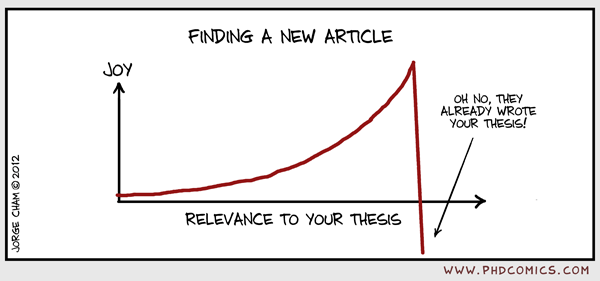Balancing Naivete and Skepticism in Research
You start a new project. You start with some literature research, reading well-known papers from all of the top journals and conferences. You even replicate some seminal results with moderate effort. Everything generally seems to make sense. You try out some interesting new ideas that appear to work well, only to find out in the following week that someone published a paper on it three years ago with far better results. Now, it seems that for every new idea you come up with, there’s a corresponding paper that came out last week on arXiv.

Could it be that all of the research that’s worth doing has already been done? How do you press on? You dejectedly glance again at your latest usurper, despairing at the accolades that you will never receive. That is, until you start reading past the abstract. It turns out that the paper either
- Made the same claims but had less than convincing results, or
- Presented similar results in a different way, or
- Simply had a similar-sounding abstract.
With experience, (3) becomes fairly straightforward to mitigate but even (1) and (2), while disappointing at first, can be used to motivate some great work.
Published papers are merely the final product. While gleaning through the meticulous flow diagrams or the tome of an appendix filled with mathematical proofs, a junior researcher might barely grasp the work’s contents let alone the thought process and larger context that underpins it. They may come out of it highly encouraged or disheartened, underestimating either (a) the sheer magnitude of labor and insight necessary to produce the paper or (b) their own ability to do the same. How do they deal with this? Naive optimism is key to starting and carrying out an ambitious project (especially where others have seemingly failed) yet in excess can lead to self-delusion. Skepticism and self-critique can help set realistic expectations to prevent crushing disappointment, but can lead to premature dismissal of promising directions.
Balancing these somewhat opposing forces echoes some of the points from my first blog post, where I presented my thoughts on some of the building blocks of reasoning. Without knowing anything, we start by taking facts as they are given under a simplified assumption of how the world works. We can then start critiquing our understanding of the world and, while filtering incoming information through this model, continue to refine it. I argue that the next step — synthesizing new thoughts and ideas — mandates a delicate balance between naivete and cynicism.
- Take turns being “dumb” and “smart”. With repetition, it’s easy to get stuck in one mode of thinking (e.g. low-level and incremental or abstract and everchanging). Asking simple, fundamental questions can completely reorient your perspective on a problem. On the other hand, properly applying the critical eye can prune away hundreds of hours of needless exploration.
- Maintain a healthy amount of ego. There’s a fine line between self-confidence and egotism. Persevering through the inevitable failed experiments and paper rejections hinges on having sufficient confidence in your own abilities, but also on having the humility to admit that you were wrong.
A third related point has to do with research enjoyment. Since starting my PhD, I’ve often tried to reduce the number of things I force myself to do. My rationale was that this lack of interest implied that I was working on the wrong problem. Over extreme lengths of time, this is absolutely true. But I’ve since realized that always expecting meaningful progress to coincide with some kind of fun is rather unrealistic.
- Optimism doesn’t mean having fun all the time. Research is an iterative process, with the occasional peaks that dot a gradual slope of incremental meandering. It’s easy to get sidetracked by always following the gradient of what’s immediately interesting. Sometimes the only way forward is through a long stretch of diligence. The role of optimism is to convince yourself that it’s all worth it in the end.